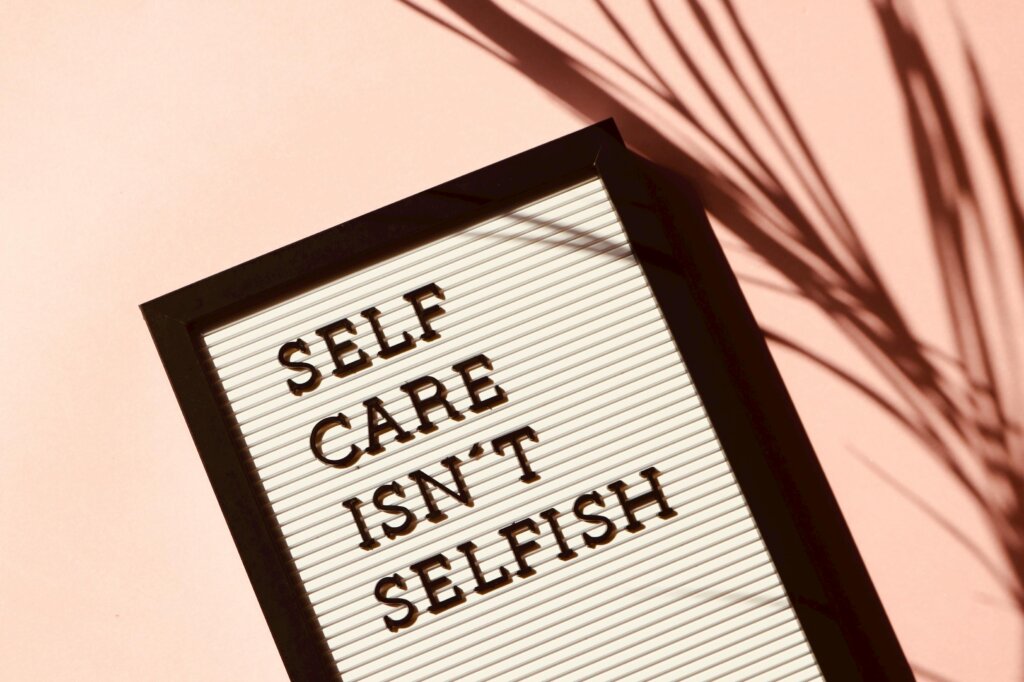How self care improves mental health- Today we will talk about the deep relationship between our mental health and self-care. Often we become so busy in our daily busy lives that we do not pay attention to the health of our mind.
But, do you know how we can improve our mental health by doing self-care? Let’s get started and understand what is the relationship between mental health and self-care.
First, we have to understand why mental health is so important. Just as we take care of our body, we should also take care of our mind. Mental health is affected by our thoughts, emotions, and behavior, which affect our life.
But what is self-care? Self-care means taking care of yourself, taking care of your mind and body. This can be different for any person – some people exercise, some people spend time doing their favorite things, and some people just indulge in their favorite activities.
Now let’s come to some of the main benefits of self-care. How can we improve our mental health by doing self-care?
It reduces stress and anxiety, our mood and emotions improve, our self-esteem increases, and we experience peace and happiness in our lives.
So friends, are you ready to improve your mental health? If yes, then let’s move ahead and understand how we can improve our mental health by doing self-care.
Understanding Mental Health

Mental health is an important issue which is being given a lot of importance these days. But do you know its true meaning? Health of mind means strength and health of our mind and personality. It affects our thoughts, feelings and behavior.
This is a simple example of why examining and understanding mental health is important in our lives. Just as there are symptoms of any disease in the body, similarly there are many symptoms of the mind which show us whether our mind is healthy or not.
There are some important challenges that affect mental health. Such as depression, anxiety, stress, and phobias. These problems come into our lives frequently and affect our daily activities.
To understand the importance of mind health, it is important to know how it affects our life and health. A person who is not mentally healthy cannot take interest in his daily activities, his attention keeps wandering here and there, his time gets wasted and he does not feel happy and satisfied.
Therefore, it is important to understand what impact mental health has on our lives. Our strength, our relationships, our career growth, and our happiness all depend on the health of our mind.
So friends, I hope you understood what mental health is, what its importance is, and some common mental health challenges. Next step, we’ll talk about self-care and understand how we can improve our mental health. (how self care improves mental health)
How self care improves mental health?
When it comes to taking care of your mind, the importance of self care cannot be compared to anything else. It is an important part of every human being’s life, especially when we talk about mental health. Self care means loving yourself and taking care of your body, mind and spirit.
A person who is dedicated to self-care keeps his mind at peace. Taking some time for yourself every day, paying attention to your body’s needs, and eating healthy foods – all these things help a person feel happy and fulfilled.
There is a deep connection between mental health and self-care. When we take good care of ourselves, our mind also remains calm and stable. Regularly practicing methods like yoga, meditation and exercise also keeps our mind calm and happy.
So remember, love yourself and make self-care a part of your daily routine. After all, a healthy mind is the basic condition for a happy life.
The Connection Between Self-Care and Mental Health

We all know how important self-care is for the health of our body and mind. But have you ever wondered what the relationship is between self-care and mental health? How do these two connect? Let us understand this issue in depth.
There is a deep connection between self-care and mental health. When we take good care of ourselves, we also improve our state of mind.
With self-care we can keep our state of mind stable. When we meet the needs of our body and mind, we understand ourselves and engage in activities to improve our lives.
Self-care has a huge impact on our stress and anxiety levels. When we take care of the health of our mind, then we experience peace and happiness in our life.
Self-care activities like yoga, meditation, or even a simple walk reduce our stress levels and make us feel better.
It is important for us to understand the importance of self-care practices. When we take care of ourselves, we also take care of the health of our mind.
Self-care is a kind of ‘me time’ in which we connect with ourselves and fulfill our needs. (how self care improves mental health)
It is also important to include self-care activities in your day. Whether it’s a little exercise, some time to meditate, or just spending time with a good friend – even small things can be a part of self-care.
But if we ignore our self-care, it also affects our mental health. When we do not give time to ourselves, our stress level increases and
Our mind gets disturbed. This anxiety also affects our relationships and easily makes our lives unbearable.
Therefore, friends, one should always take care of one’s self-care. If we want to improve the health of our mind, then make self-care a part of our life and take care of our mind by giving it love and respect. Because only when we take good care of ourselves, we can improve the health of our mind.
You may like to read our article on- Scleroderma Self-Care: Improve Your Quality of Life
Key Components of Self-Care

Self-care is a process that helps us take care of our body, mind, and spirit. It is a holistic approach that includes many different elements that improve our overall health. Let’s take a look at how the key components of self-care relate to each other. (how self care improves mental health)
Physical Self-Care:
It is very important to understand the importance of physical self-care. When we take care of our body, we feel healthy and active. It includes some key components such as exercise, nutritious diet, and sleep.
Exercise:
Exercising provides energy to the body and improves blood circulation. By doing regular exercise our mind also remains happy and active.
Nutrition:
Eating a proper nutritious diet is also an important aspect of physical self-care. Our body requires all kinds of nutrition which strengthens our immune system and maintains better health.
Sleep:
It is also very important to understand the importance of sleep. Getting adequate and quality sleep relaxes both our mind and body, and leaves us feeling refreshed and energetic.
Emotional Self-Care:
Emotional self-care involves understanding and coping with our emotions. It covers some key areas such as stress management, emotional expression, and boundaries.
Stress Management:
To understand and cope with stress, we should use various stress management techniques, such as deep breathing, meditation, and relaxation exercises.
Emotional Expression:
Expressing and sharing your feelings is also an important aspect of emotional self-care. Talking with friends, journaling, or even talking to a therapist can help us understand and cope with our feelings.
Boundaries:
Setting appropriate boundaries for yourself is also an important part of emotional self-care. We should utilize our time and energy properly and protect ourselves from any person or situation that can harm our emotions.
In all the key components of self-care, we need to take care of ourselves so that our body, mind, and spirit remain healthy and happy. By including all these dimensions in our daily life, we can improve our overall health. (how self care improves mental health)
Benefits of Self-Care for Mental Health

The impact of self-care on our mental health is profound. When we take good care of ourselves, our mind also gets peace and tranquility. Let us see the benefits of self-care on mental health.
Stress and anxiety levels reduce:
When we take care of our body and mind, our stress and anxiety levels are reduced. The hormones released from the body by doing regular exercise help in keeping our mind calm and happy.
Apart from this, by using meditation and relaxation techniques, we can also stabilize our state of mind and reduce stress.
Improves mood and emotional control:
Self-care improves our mood and enables us to manage our emotions better. Emotional self-care activities such as journaling, artistic expression, and sharing our feelings bring peace and happiness to our minds and stabilize and empower our personality.
Increases alertness and ability to come forward:
Self-care practices also impact our creativity and ability to thrive. When we face difficulties in our life, self-care makes us stronger to face that difficulty. Eating the right nutritious diet, regular exercise, and getting enough sleep increases the stamina of our body and mind and we can work strongly even in difficult times.
Increases self-compassion and self-worth:
By practicing self-care we learn how to understand and love ourselves. When we take time for ourselves and fulfill our needs,
Then we value ourselves. This increases our self-compassion and self-worth and we start understanding ourselves correctly.
Relationships and social relations improve:
When we take care of ourselves, we can also improve our relationships and social interactions. When we have peace and happiness in our mind, we behave well with others and our relationships and social relations prosper.
All these benefits prove that self-care is a very important and powerful tool in improving our mental health. Therefore, we should always take care of our body and mind and include self-care activities in our daily life so that our mind remains healthy and happy. (how self care improves mental health)
Implementing Self-Care Practices

It is very important to include self-care in our life so that our mind and body remain healthy and happy. But, how can we implement self-care practices? Come, let’s see some tips and strategies that help us make self-care a part of our lives.
Identifying individual needs and preferences:
The first step in self-care is to recognize our individual needs and preferences. Everyone’s self-care style is different, so it’s important to understand ourselves, what kind of activities we enjoy and what we find refreshing and relaxing.
Creating a self-care routine or plan:
It’s also important to incorporate self-care into a regular routine or plan. Dedicate yourself some time every day to some self-care activity. For this, you can make a schedule or calendar in which you can organize your self-care activities.
Overcoming Barriers to Self-Care:
Sometimes many challenges come in our life which affect our self-care. But, overcoming these challenges is also in our hands. We need to take our time.
By managing, you should take out time for self-care and set your priorities properly.
Incorporating Self-Care into Your Daily Life: Tips and Strategies:
There are some tips and strategies to help us incorporate self-care into our daily lives:
Schedule your day and include self-care activities in it.
Design your environment according to your mood – like listening to soothing music, or using calming colors.
Involve your friends or family members in your self-care routines — doing yoga together or cooking together and trying healthy recipes.
Make time to take short breaks from time to time and give yourself a chance to relax – go for a walk, or just spend some quiet time with a cup of tea.
By following these tips and strategies, we can seamlessly incorporate self-care into our lives and take care of our mind and body. This will make our life happy and prosperous and we will be able to unlock and understand our full potential. (how self care improves mental health)
Examples of Self-Care Activities

Self-care consists of many different activities that help improve our body, mind, and relationships. Let us see some self-care activities that we can include in our lives.
physical:
Exercise: Doing a little exercise daily keeps our body active and healthy. Be it jogging, yoga, or going to the gym – exercise makes our body strong and healthy.
Healthy diet: Eating a nutritious diet is also an important aspect of physical self-care. By consuming fresh fruits, vegetables, whole grains, and lean proteins, we provide our body with the essential nutrients it needs for health.
Adequate Sleep: Complete and quality sleep helps our body and mind relax. Try to get at least 7-8 hours of sleep so that our mind and body remain fresh and energetic.
emotional:
Journaling: Writing down your thoughts is a great way to understand and express your feelings. Writing down what’s on your mind daily and expressing your thoughts and feelings improves our emotional development.
Practicing Virtual Gratitude: Creating a virtual gratitude journal every day is also an effective self-care activity. Expressing gratitude for certain things or people every day makes us feel happy and relaxed.
Seek therapy: If you feel that your emotions are becoming difficult to handle, talking to a counselor may be a good option. Through therapy we face the problems of our mind and solve them.
Mental:
Meditation: Meditation calms and stabilizes our mind. By meditating for some time daily, we can keep our thoughts stable and calm.
Deep breathing exercises: Taking deep breaths and exhaling slowly helps our mind and body to relax. It also reduces our stress and anxiety levels.
Cognitive Restructuring: Use cognitive restructuring techniques to transform your negative thoughts into positive and constructive thoughts. With this we keep our mind active and stable.
Social:
Spending time with loved ones: Spending time with loved ones is also an important aspect of social self-care. Talking with friends and spending time with them makes our mind feel happy and fulfilled.
Joining support groups: If you feel that solutions to your problems may be found in a support group. Through support groups we face the problems of our mind and solve them.
By incorporating all of these self-care activities into our lives, we can improve our overall well-being and take care of our mind, body, and relationships. (how self care improves mental health)
Self-Care for Specific Mental Health Challenges

Every person’s mental health condition is different, so the method of self-care is also different for every person. Let’s look at some specific self-care techniques that can help address specific mental issues like anxiety, depression, and stress.
Worry:
Calming techniques: A variety of calming techniques can be used to reduce anxiety, such as deep breathing, progressive muscle relaxation, and guided imagery. By practicing these techniques regularly, we can keep our mind calm and stable.
Publication therapy: Another way to reduce anxiety is publication therapy. In this we face our fear and gradually desensitize it. This resolves the fear in our mind and we get relief from our fear.
Self-Compassion Practice: Loving and respecting yourself is also an important aspect of managing anxiety. Self-compassion practices such as positive self-talk and self-affirmations make our mind happy and empowered.
depression:
Exercise: An easy way to reduce depression is to exercise regularly. Exercising releases endorphins from our body which stimulate our mood and make us feel happy and energetic.
Social support: Spending time with your friends and family also helps handle depression. Talking with friends and sharing our feelings with them gives peace and prosperity to our mind.
Behavioral activation: Another way to reduce depression is behavioral activation. In this, we make our daily routine active and engaging, due to which we feel happy and energetic and we are able to come out of our fear.
Tension:
Time Management: One way to reduce stress is effective time management. Organizing our time properly and getting our priorities reduces stress and makes us feel in control.
Assertiveness Training: Setting your boundaries properly is also an important aspect of reducing stress. Through assertiveness training we can properly express our needs and preferences and control our social interactions.
Mindfulness Meditation: By doing mindfulness meditation, we keep our mind calm and stable. In this we live in the present moment and keep our thoughts stable and calm, which reduces our stress levels and we can live our life happily.
By incorporating these self-care techniques in our life, we can solve the problems of our mind and fill our life with happiness and peace. (how self care improves mental health)

Conclusion
In this article we saw how important self-care is in improving your mental health. Every person is different and his state of mind is also different, so it is important for every person to choose the right self-care techniques for him.
Taking care of our physical, emotional, mental, and social well-being makes our life happy and prosperous. By incorporating self-care activities into our daily routine, we keep our minds calm and stable and enjoy living life to its fullest potential.
Therefore, we should make self-care a priority in our lives and improve our mental health. Because a healthy mind is the foundation of a happy life. (how self care improves mental health)
I hope you have liked the information we have shared in our article, to know more about this you can read our other article too.
Facts and Stats
Mental Health Landscape in the US:
- According to the National Institute of Mental Health (NIMH) [Source: National Institute of Mental Health], one in five adults in the US experiences mental illness in a given year.
- Among US youth, mental health challenges are also significant. The Centers for Disease Control and Prevention (CDC) reports [Source: Centers for Disease Control and Prevention], that in 2021, 20.7% of adolescents aged 12-17 experienced major depressive episodes.
Self-Care and Mental Health Benefits:
- A study published in the Journal of American College Health found a positive correlation between self-care practices and mental health outcomes in college students [Source: Journal of American College Health]. Students who engaged in self-care reported lower levels of depression and anxiety.
- The American Psychological Association (APA) highlights the effectiveness of self-care in managing stress [Source: American Psychological Association]. By incorporating self-care routines, individuals can build resilience and better cope with daily stressors that can negatively impact mental well-being.
Self-Care Practices:
- A 2020 survey by the American Psychological Association (APA) revealed that the top self-care activities reported by Americans to manage stress included getting enough sleep (78%), eating healthy foods (73%), and exercising regularly (72%) [Source: American Psychological Association].
- Additionally, mindfulness practices like meditation and spending time in nature have also been shown to be effective for improving mental health [Source: National Center for Complementary and Integrative Health].
Remember to cite your sources appropriately.
Additional Tips:
- You can personalize the impact further by mentioning the economic burden of mental illness in the US. According to the NIMH, the annual cost of mental illness in the US is estimated to be $206 billion in lost productivity and additional medical expenses [Source: National Institute of Mental Health]. By promoting self-care, you can emphasize its potential to not only improve well-being but also reduce societal healthcare costs.
- Briefly discuss the limitations of self-care. While self-care is crucial, it’s not a replacement for professional help. Encourage readers to seek professional support if they are struggling with mental health challenges.
By incorporating these facts and stats, you can create a compelling blog post that highlights the importance of self-care for improving mental health in the US. (how self care improves mental health)
Sources
- Mental Health Landscape in the US:
- Source: National Institute of Mental Health (NIMH) https://www.nimh.nih.gov/
- Statistic: One in five adults in the US experiences mental illness in a given year.
- Source: Centers for Disease Control and Prevention (CDC) https://www.cdc.gov/
- Statistic: In 2021, 20.7% of adolescents aged 12-17 experienced major depressive episodes. (how self care improves mental health)
- Self-Care and Mental Health Benefits:
- Source: Journal of American College Health https://pubmed.ncbi.nlm.nih.gov/2926027/ (Study published here)
- Finding: Positive correlation between self-care practices and mental health outcomes in college students (lower depression and anxiety).
- Source: American Psychological Association (APA) https://www.apa.org/
- Information: Self-care’s effectiveness in managing stress.
- Self-Care Practices:
- Source: American Psychological Association (APA) https://www.apa.org/ (2020 survey)
- Statistics: Top self-care activities reported by Americans to manage stress:
- Getting enough sleep (78%)
- Eating healthy foods (73%)
- Exercising regularly (72%)
- Statistics: Top self-care activities reported by Americans to manage stress:
- Source: National Center for Complementary and Integrative Health https://www.nccih.nih.gov/
- Information: Effectiveness of mindfulness practices for improving mental health (meditation, spending time in nature).
- Additional Tips:
- Source: National Institute of Mental Health (NIMH) https://www.nimh.nih.gov/
- Statistic: Annual cost of mental illness in the US estimated at $206 billion.
FAQs about Self-Care and Mental Health:
Is self-care important only for physical health?
No. Self-care provides support for physical, mental, emotional, and social health. It helps us to live a balanced life.
How can self-care be incorporated into our everyday lives?
We need to find time to incorporate self-care into our daily routine, such as meditation, yoga, social interaction, and enjoying art.
Is there a specific age limit for self-care?
No, you can start self-care at any age. It is beneficial at any age.
Can self-care strengthen one’s mind?
Yes, by doing self-care we can make our mind strong and stable. It gives us the ability to deal with stress and tension.
Can self-care be done only on good days?
No, we should adopt self-care on both happy and sad days. It helps us to take care of our mind as well as the environment around us.
Can self-care make us happy and satisfied?
Yes, self-care helps us look at our life positively and makes us happy and satisfied.
Does self-care promote loneliness?
Self-care encourages us to connect with ourselves and understand our self-identity. It makes us more self-reliant and self-confident.